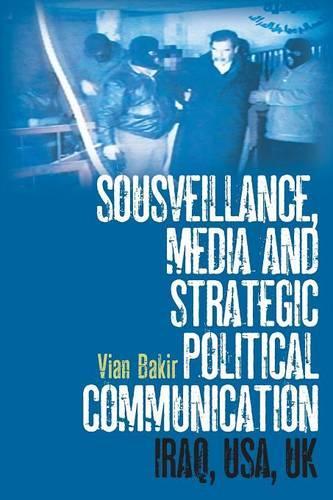Full Product Details
Author: Dr. Vian Bakir
Publisher: Continuum Publishing Corporation
Imprint: Continuum Publishing Corporation
Dimensions:
Width: 15.30cm
, Height: 1.80cm
, Length: 22.80cm
Weight: 0.434kg
ISBN: 9780826430090
ISBN 10: 0826430090
Pages: 256
Publication Date: 01 May 2010
Audience:
Professional and scholarly
,
Professional & Vocational
,
Postgraduate, Research & Scholarly
Format: Paperback
Publisher's Status: Active
Availability: Manufactured on demand

We will order this item for you from a manufactured on demand supplier.
Language: English
Reviews
This is a scholarly, well-researched book that casts new light on one of the most important aspects of the media of conflict, the rise of voices from below. Vian Bakir has put together a series of meticulously detailed case studies on how the use of social media changed during the US and UK invasion and occupation of Iraq. By placing individuals' blog entries and digital images against a close reading of the political and media contexts in the west and Iraq, she takes us well beyond a celebration of sousveillance to a critical appreciation of the role of social media in both disrupting and furthering the political control of communication. Donald Matheson, senior lecturer in media and communication, University of Canterbury, New Zealand A timely and much-needed study on the challenges that participatory media pose to strategic political communication, which offers a novel comparative perspective on Western and Middle Eastern cases as well as original theoretical insights on the social dialectics of power and resistance- surveillance and sousveillance. Lilie Chouliaraki, Department of Media and Communications, London School of Economics and Political Science The concept of 'sousveillance' proves to be an intriguingly provocative entry point into a fascinating set of debates. Vian Bakir's inspired critique delves deeply into a wide range of pressing issues at the heart of current innovations in participatory media. Professor Stuart Allan, Bournemouth University, UK
A timely and much-needed study on the challenges that participatory media pose to strategic political communication, which offers a novel comparative perspective on Western and Middle Eastern cases as well as original theoretical insights on the social dialectics of power and resistance- surveillance and sousveillance. Lilie Chouliaraki, Department of Media and Communications, London School of Economics and Political Science
This is a scholarly, well-researched book that casts new light on one of the most important aspects of the media of conflict, the rise of voices from below. Vian Bakir has put together a series of meticulously detailed case studies on how the use of social media changed during the US and UK invasion and occupation of Iraq. By placing individuals' blog entries and digital images against a close reading of the political and media contexts in the west and Iraq, she takes us well beyond a celebration of sousveillance to a critical appreciation of the role of social media in both disrupting and furthering the political control of communication. --Donald Matheson, senior lecturer in media and communication, University of Canterbury, New Zealand
The concept of ‘sousveillance' proves to be an intriguingly provocative entry point into a fascinating set of debates. Vian Bakir's inspired critique delves deeply into a wide range of pressing issues at the heart of current innovations in participatory media. --Professor Stuart Allan, Bournemouth University, UK This is a scholarly, well-researched book that casts new light on one of the most important aspects of the media of conflict, the rise of voices from below. Vian Bakir has put together a series of meticulously detailed case studies on how the use of social media changed during the US and UK invasion and occupation of Iraq. By placing individuals' blog entries and digital images against a close reading of the political and media contexts in the west and Iraq, she takes us well beyond a celebration of sousveillance to a critical appreciation of the role of social media in both disrupting and furthering the political control of communication. --Donald Matheson, senior lecturer in media and communication, University of Canterbury, New Zealand A timely and much-needed study on the challenges that participatory media pose to strategic political communication, which offers a novel comparative perspective on Western and Middle Eastern cases as well as original theoretical insights on the social dialectics of power and resistance- surveillance and sousveillance. --Lilie Chouliaraki, Department of Media and Communications, London School of Economics and Political Science Mentioned on the RSA Conference blog. [Bakir's] case studies of the respective developments in the Iraq War since 2003... are carefully argued, insightful and revealing. They should inevitably become required readings on the mediatisation of international relations as they diligently illuminate the underlying complex and at times ambiguous dynamics. -- Political Studies Review Vol. 10 ""Sousveillance, Media and Strategic Political Communication provides an interesting look at how Web 2.0 generates an intensification of the notion of sousveillance and the rise of sousveillance cultures. For anyone who wants an understanding of how media worked and continues to operate in the Iraq conflict, Sousveillance is required reading.""-Ben Rothke, author of Computer Security: 20 Things Every Employee Should Know
Author Information
Dr. Vian Bakir is Senior Lecturer in Journalism, in the School of Creative Studies & Media, at Bangor University, UK.




